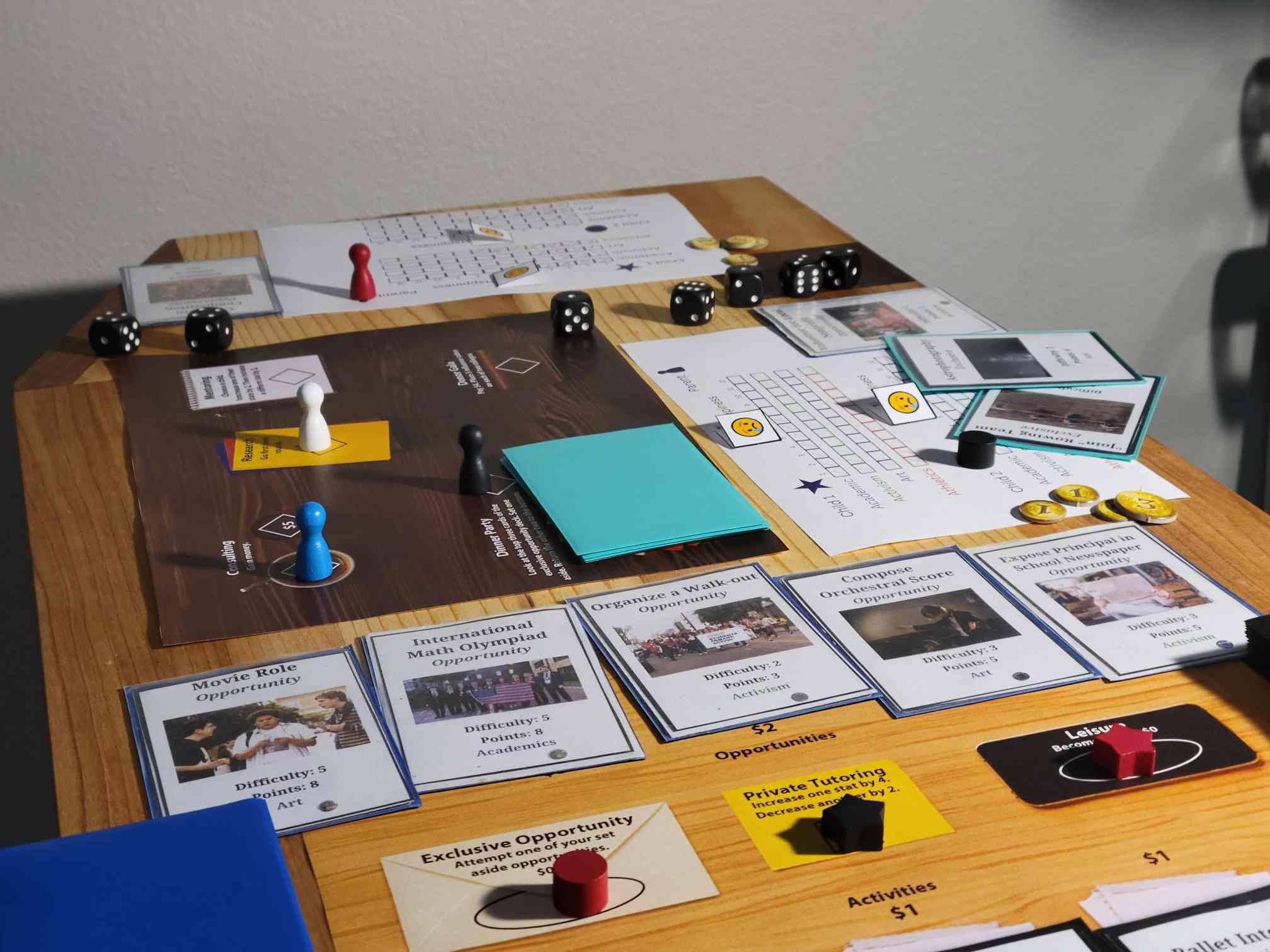A game by Arnav Mehta, Grace Xu, Sam Jett, and Seamus Allen.
Artist Statement
Helicopter Parent is a game about the extreme rigor parents put their children through to get them into elite colleges and the role of wealth in that process. The worker placement framework of the game literally instrumentalizes the children. They are turned into wooden pawns for the parent to move as they see fit. The child’s happiness is, at most, a minor consideration, and most spaces on the board cost money.
By being constructed in this way, the game aims to impart two messages on its audience. One, it aims to represent the complexity of meritocracy: the children of the richest kids don’t just get into colleges because of bias, but also because having enormous amounts of time and money dedicated to their education makes them genuinely more qualified individuals. Two, and more importantly, it aims to have players question the ethics of helicopter parenting: is it just to treat children as pawns in the game of success. And if we have built a system that makes parents feel like doing so is a necessity to ensure their children have a happy life, is that system worth it?
Concept Map
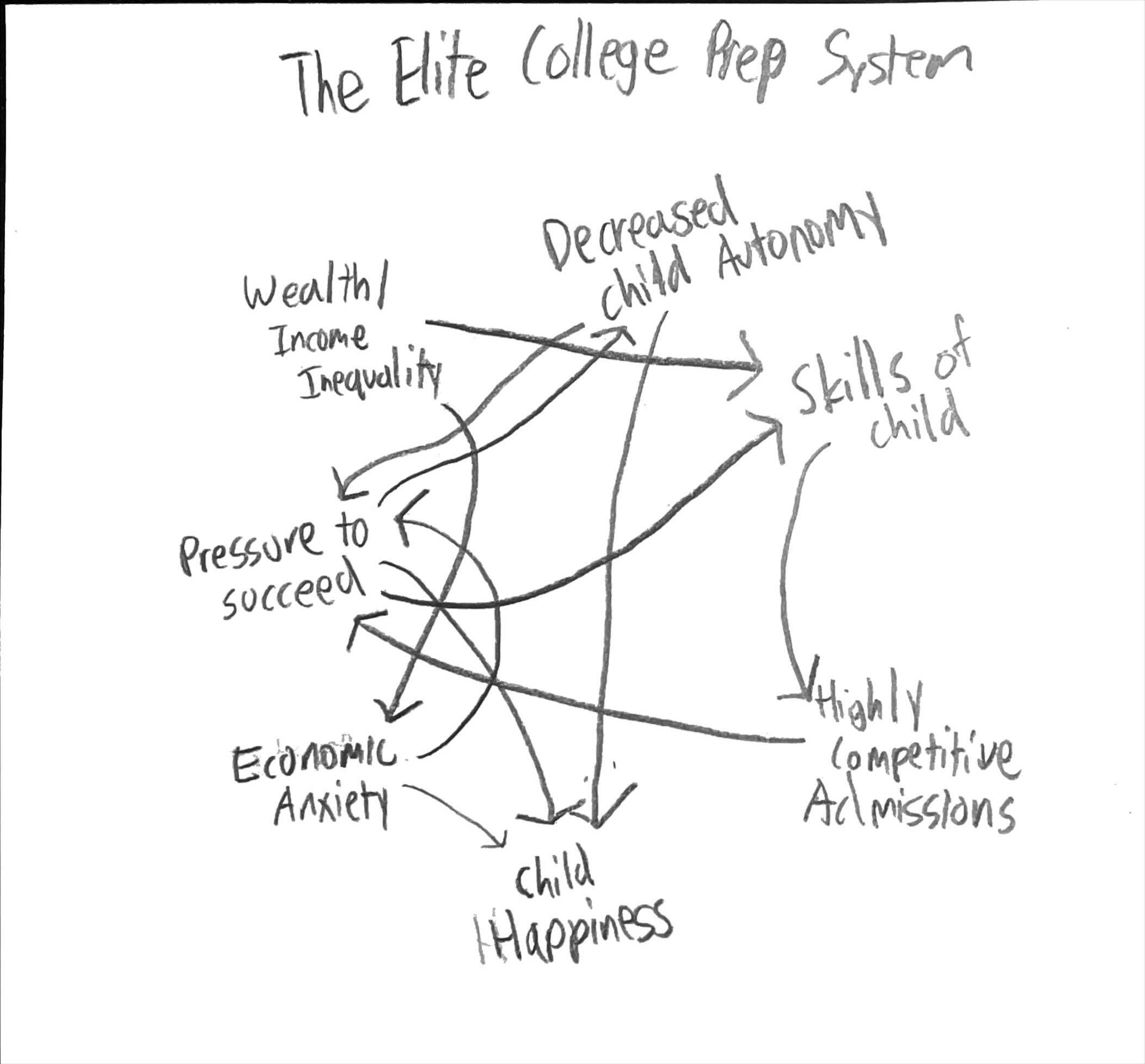
Rules and Materials
You can view the Helicopter Parent Rules here: https://docs.google.com/document/u/5/d/e/2PACX-1vTDH35LvXPt1XJO2WVR8eh6ibWi8a79syRsXSX8rRgAYRIQ1jIyAZauf2MovHTjQIEqHTL7Dp0uNLDm/pub
You can download the print-and-play game components at the following links:
Child board: https://drive.google.com/file/d/1W8XSCl8Ri_vkiV9-v36ogJRmMWznb_53/view?usp=sharing
Parent board: https://drive.google.com/file/d/16Ra77ha2H2qXnKMtgdSy1bQxMkHz93Vb/view?usp=sharing
Cards and child boards: https://www.canva.com/design/DAGXWuHD0yQ/CkXGyvwmhAAgwbuiTzw0lA/view?utm_content=DAGXWuHD0yQ&utm_campaign=designshare&utm_medium=link&utm_source=editor
History and Version of the Game & Playtests
The development of Helicopter Parent took place over multiple iterations, with each stage informed by focused playtesting and detailed feedback.
Note: We start from playtest-4 because playtests 1,2 and 3 were on a different game and we pivoted away from it mid-project.
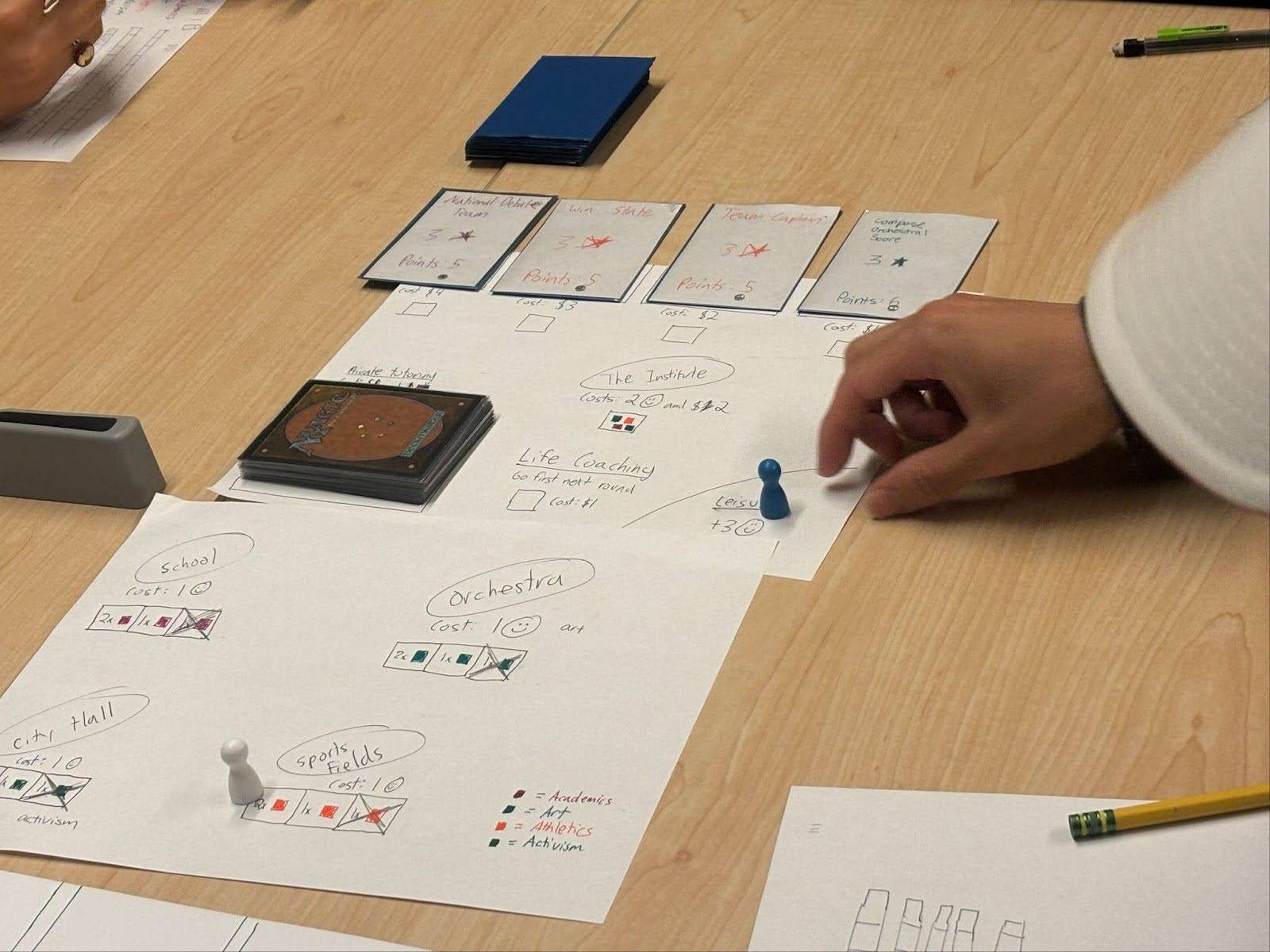
Playtest 4: In-Class Testing
- Participants: CS377G peers
- Feedback:
- Game was too slow
- It felt like college should be the most important thing, when really it was the opportunities
- Rolling for Opportunity cards was very dramatic and exciting.
- Talent cards, the institute, and life coaching were undervalued, leading to repetitive gameplay.
- Changes Made:
- Increased points from college admissions
- Gave children starting skills to get the game going faster
- Reduced costs of the undervalued locations

Playtest 5: Playtest at BOB
- Participants: Two P3 Group members and two other Stanford undergraduates
- Feedback:
- Resource competition felt insufficiently intense, reducing strategic tension.
- Happiness was an uninteresting resource, simply forcing players to take a turn off every few moves.
- The game was overall too static: players made similar decisions in every round and did not need to substantially adjust their strategy as the game progressed.
- Changes Made:
- Reworked happiness mechanic to a temporary buff for competitions.
- Since talent cards felt very exciting, we changed the main skill-building mechanic to take on their form. Instead of choosing from the same locations every round, new activity cards would be dealt out each round for players to consider.
- Added parent meeples. These allowed us to make money a more important resource, and create some interesting decisions regarding which meeple to move first, and to refine the game’s inequality-based critique.
- Added exclusive opportunities, which further enriched the game’s satire of the system and gave players better long-term goals to work towards.
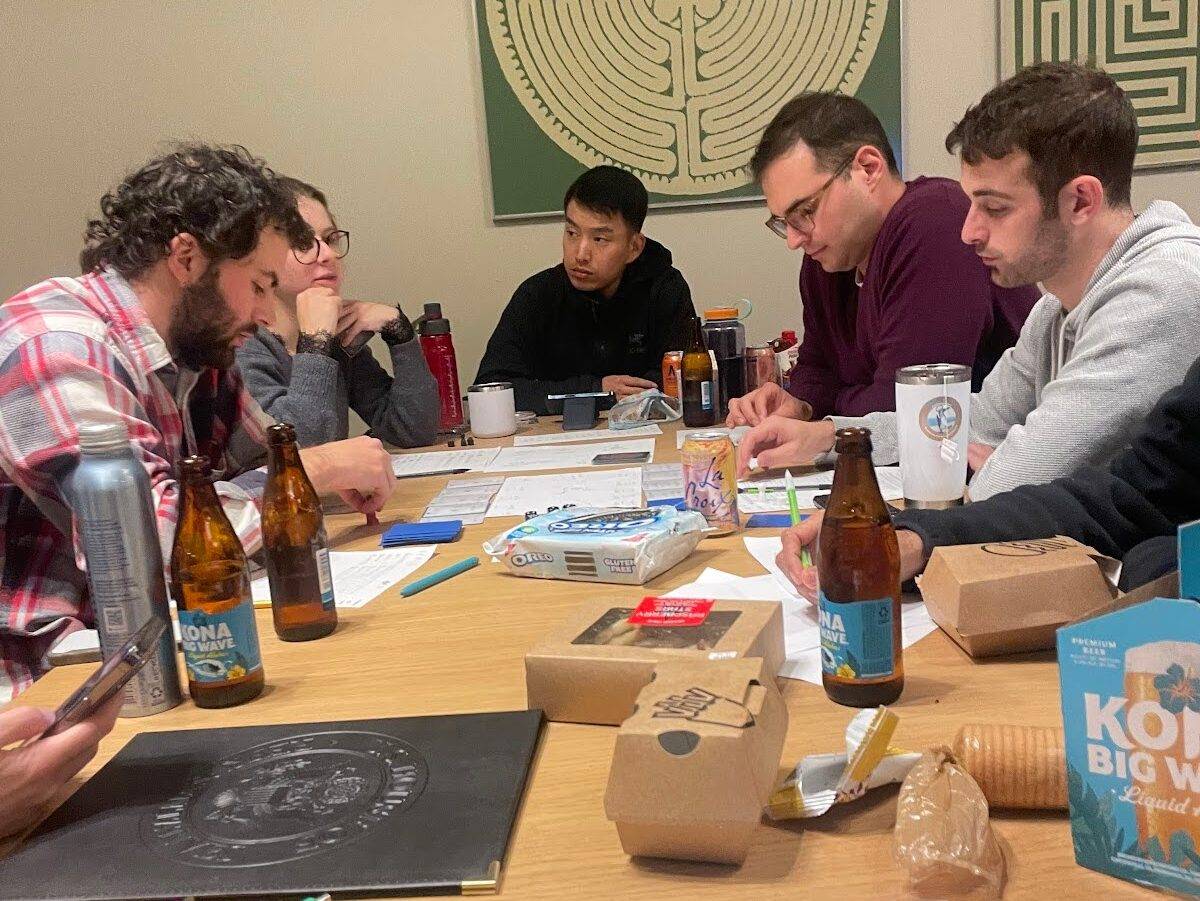
Playtest 6: MBA Students
- Participants: Five GSB Students (two of them teamed up)
- Feedback:
- The stat-specific college requirements (15 points for top colleges, 6 for the lowest) were too high, creating imbalance as players focused solely on maximizing one child’s stats, ignoring broader strategies.
- Opportunity cards still lacked meaningful impact.
- The changes from the last playtest were successful. Players changed their strategy from round to round and disagreed with each other frequently about optimal play.
- Changes Made:
- Rebalanced college scoring to cap top colleges at 12 points and lower-tier colleges at 6, promoting balanced stat-building across multiple objectives.
- Adjusted donor gala mechanics to provide meaningful incentives:
- Players could boost three stats across two colleges for $4, compared to $6 for a single-college boost previously.
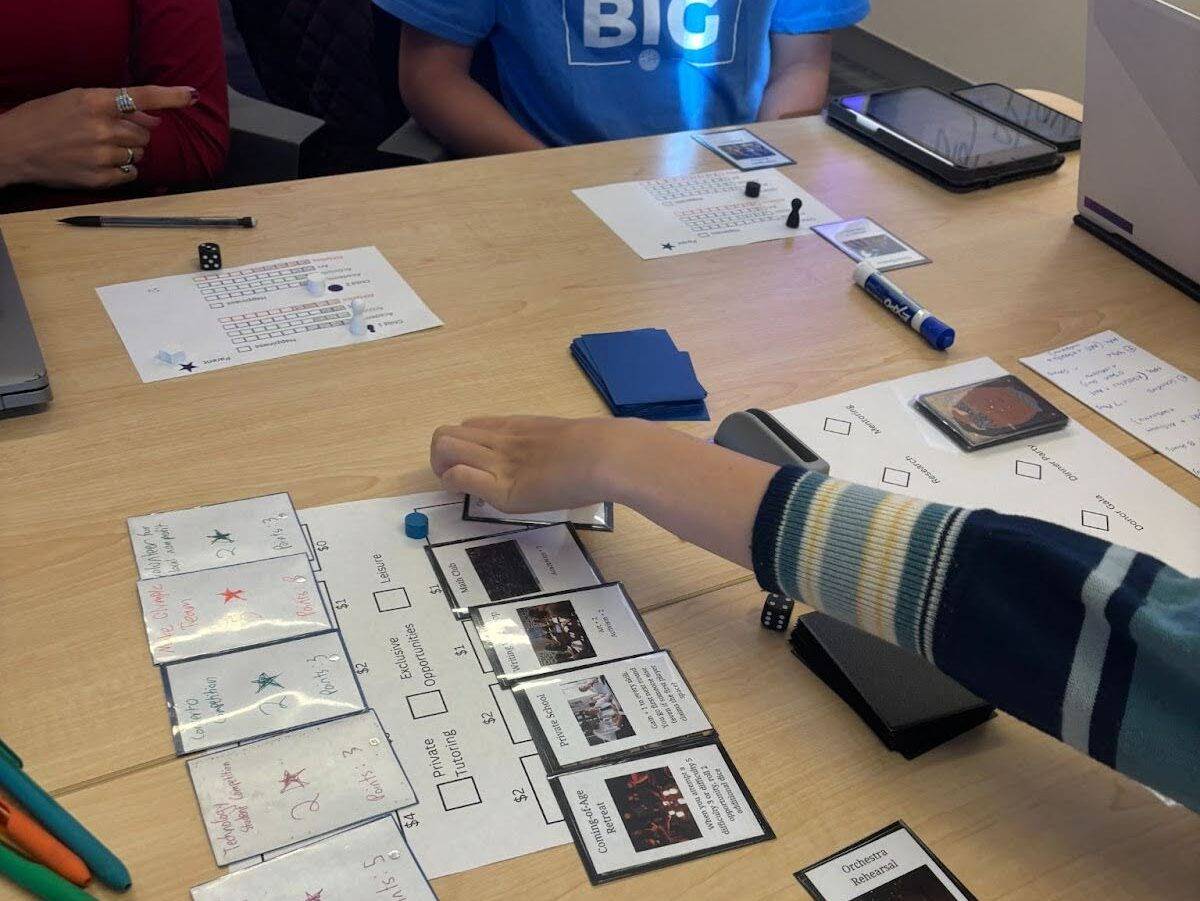
Playtest 7: In-Class Final Tests
- Participants: CS377G class members, the TA, a member from the P3 team, and Quinn (eight people split across two tests).
- Feedback:
- The rebalanced college requirements (12 points for top colleges, 6 for the lowest) encouraged more equitable stat-building, making gameplay feel less deterministic.
- Adjustments to donor gala mechanics were in the right direction, but required further tuning.
- Rules were unclear in several points, slowing down gameplay.
- The ‘star’ symbol ineffectually communicated difficulty
- The visual design of the game lacked clear labels, and didn’t include indications of effect next to spaces, forcing players to remember the effects of each location.
- Players enjoyed moments of celebrating their child’s achievements with “I did it!” comments and humor in setbacks like bad luck outcomes.
- Exclusive opportunity cards were insufficiently valuable to be worth the substantial cost to acquire them.
- Changes Made:
- Exclusive opportunities were buffed
- Donor Gala was buffed.
- The board was redesigned for an improved look and to contain descriptions of the effect of each action
- The rules were rewritten to take players step-by-step through a turn instead of frontloading all of the game’s concepts.
- Numbers and labels were added to child boards
- Star symbol on the opportunity cards was replaced with ‘difficulty’ for clarity.
Final Version
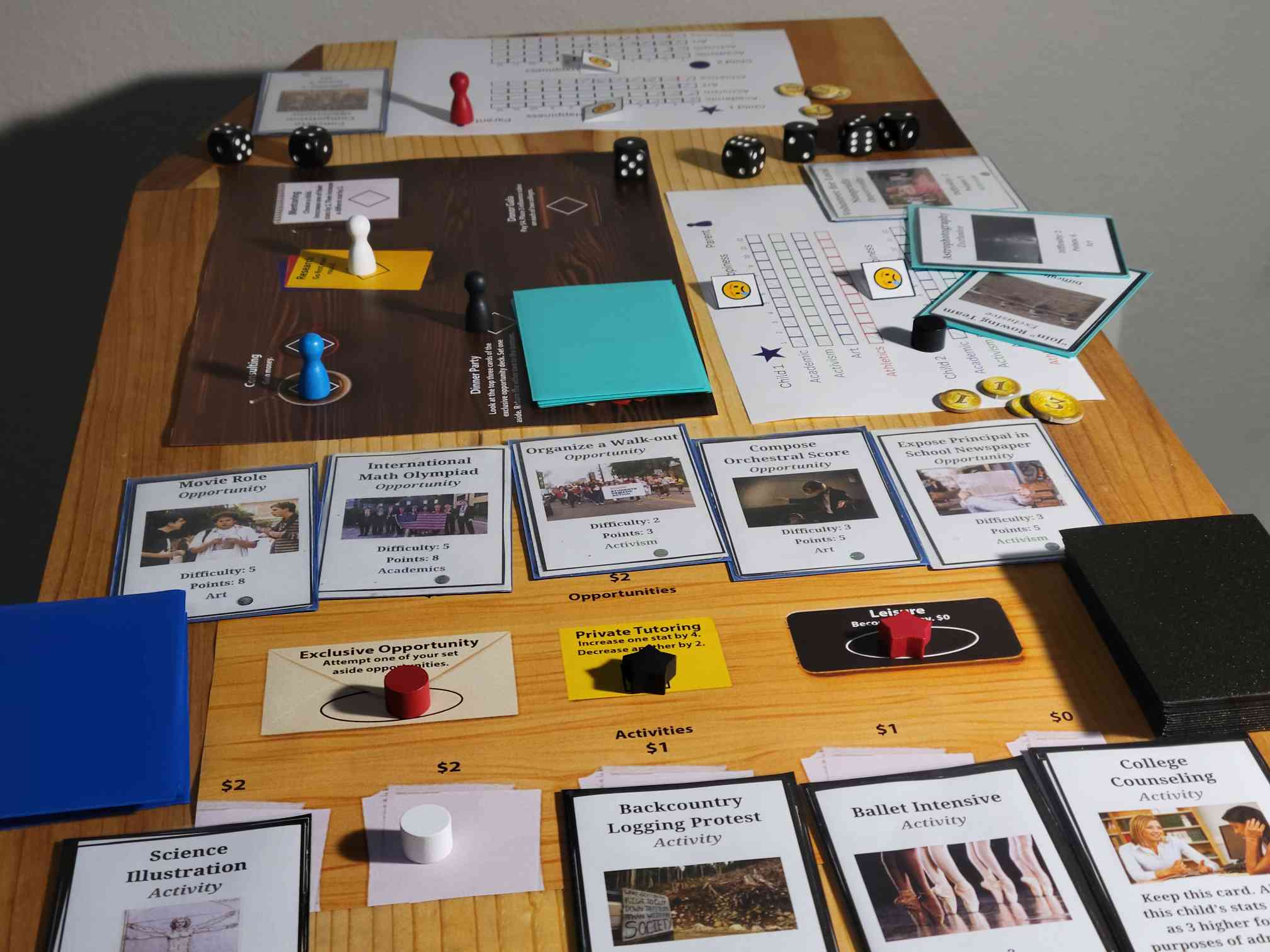
Helicopter Parent began as all bark and no bite: repetitive gameplay and tacit criticism without depth. By the end, Helicopter Parent had evolved into a strategic, dramatic game. The constant cycling of Opportunity and Activity cards gives players new options to consider in every round, whereas the dice-rolls to claim Opportunities create strong emotional highs and lows. Throughout, the game’s theming provides a sharp critique paired with opportunities for players to laugh at the absurdities of helicopter parenting and elite college admissions.


